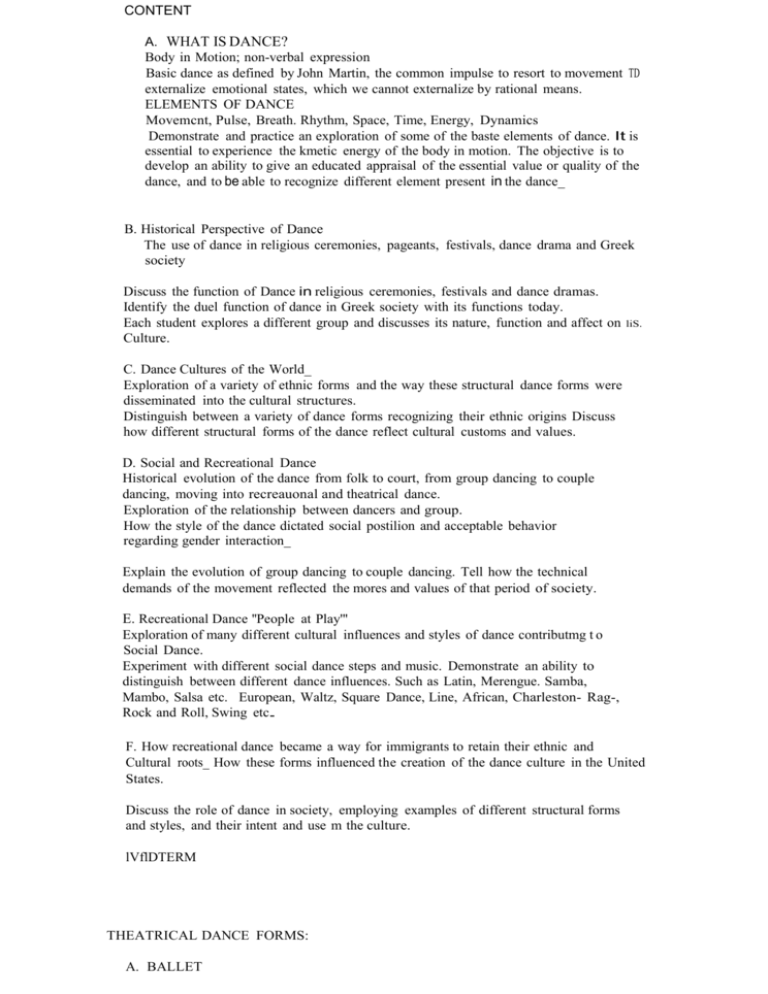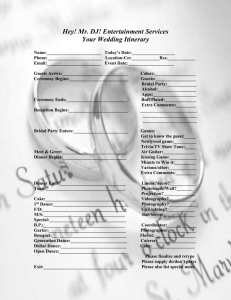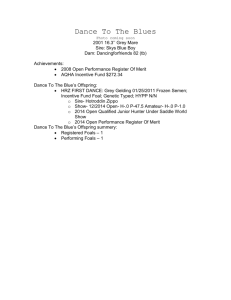dance history paper info
advertisement

CONTENT A. WHAT IS DANCE? Body in Motion; non-verbal expression Basic dance as defined by John Martin, the common impulse to resort to movement TD externalize emotional states, which we cannot externalize by rational means. ELEMENTS OF DANCE Movemcnt, Pulse, Breath. Rhythm, Space, Time, Energy, Dynamics Demonstrate and practice an exploration of some of the baste elements of dance. It is essential to experience the kmetic energy of the body in motion. The objective is to develop an ability to give an educated appraisal of the essential value or quality of the dance, and to be able to recognize different element present in the dance_ B. Historical Perspective of Dance The use of dance in religious ceremonies, pageants, festivals, dance drama and Greek society Discuss the function of Dance in religious ceremonies, festivals and dance dramas. Identify the duel function of dance in Greek society with its functions today. Each student explores a different group and discusses its nature, function and affect on Culture. liS. C. Dance Cultures of the World_ Exploration of a variety of ethnic forms and the way these structural dance forms were disseminated into the cultural structures. Distinguish between a variety of dance forms recognizing their ethnic origins Discuss how different structural forms of the dance reflect cultural customs and values. D. Social and Recreational Dance Historical evolution of the dance from folk to court, from group dancing to couple dancing, moving into recreauonal and theatrical dance. Exploration of the relationship between dancers and group. How the style of the dance dictated social postilion and acceptable behavior regarding gender interaction_ Explain the evolution of group dancing to couple dancing. Tell how the technical demands of the movement reflected the mores and values of that period of society. E. Recreational Dance ''People at Play'" Exploration of many different cultural influences and styles of dance contributmg t o Social Dance. Experiment with different social dance steps and music. Demonstrate an ability to distinguish between different dance influences. Such as Latin, Merengue. Samba, Mambo, Salsa etc. European, Waltz, Square Dance, Line, African, Charleston- Rag-, Rock and Roll, Swing etc.. F. How recreational dance became a way for immigrants to retain their ethnic and Cultural roots_ How these forms influenced the creation of the dance culture in the United States. Discuss the role of dance in society, employing examples of different structural forms and styles, and their intent and use m the culture. lVflDTERM THEATRICAL DANCE FORMS: A. BALLET B. C. D. E. MUSICAL THEATER, VAUDEVJLLE,TAP,JAZZ MODERN POSTMODERN POP-FOLK A. BALLET The development of the Ballet from Italy to the Royal courts of France, Russia, 110d the United States. a.) a brief survey of some of the major companies, dancers and choreographers. B. MUSICAL THEATER Explore the historical reference, cultural and ethnic influences of the uniquely American dance forms such as Jazz, Tap and the Musical Theater. C. MODERN DANCE Follow the development of Modern Dance beginning with Isadora Duncan and Mary Wigman. Explore the evolution of Modem Dance in America and how this dance broke from traditional standards. Survey major dancers, choreographers and companies. Observe the intent of what they were attempting to communicate. D. POST MODERN DANCE An overview of the concert dance of thc day. Exploring the evolution of the technical virtuosity of the performers to the perfection of the technology from Nikolais to Cirque De Solei]: from Meredith Monk to Pina Bausch. Discussion of how the demands on the dancer have increased. They must be able to perform all styles as well as possibly sing and act. POP-FOLK The influence of the media, Rap. H1p-Hop, MTV, Film Video, TV, Modern Technology; its far-reaching effect on the world as well as its influence on our daily lives. E. DANCE AS A HEALING ART FORM The use of dance in our daily lives. The connection of the body, mind and spirit; Somatic and kinesthetic understanding is a way to a deeper understanding of the self_ a brief exploration of some of the leaders of the dance therapy community. "Whoso Danceth not knoweth not the way of life" G.PRESENTATION OF RESEARCH PAPERS TO THE CLASS Observe how these dance styles influenced the rest of the world: and how the rest of the world was influenced by them. H_ FINAL




